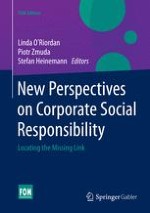2015 | OriginalPaper | Buchkapitel
24. Conceptual Framework for Corporate Responsibility Management: A Critical Review of Sustainable Business Practice Based on a Case Study of a Leading Transnational Corporation
verfasst von : Prof. Dr. Linda O’Riordan, Prof. Dr. Piotr Zmuda
Erschienen in: New Perspectives on Corporate Social Responsibility
Verlag: Springer Fachmedien Wiesbaden
Aktivieren Sie unsere intelligente Suche, um passende Fachinhalte oder Patente zu finden.
Wählen Sie Textabschnitte aus um mit Künstlicher Intelligenz passenden Patente zu finden. powered by
Markieren Sie Textabschnitte, um KI-gestützt weitere passende Inhalte zu finden. powered by
